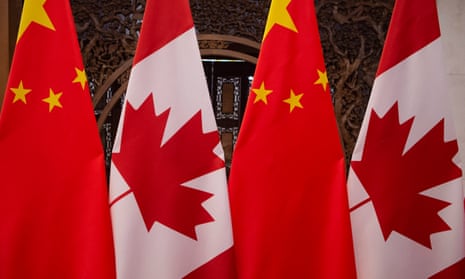Canada’s federal police force is investigating reports that clandestine Chinese “police stations” are operating in Toronto amid reports of a global network used to target overseas dissidents.
The Royal Canada Mounted Police said it was investigating “reports of criminal activity in relation to the so-called ‘police’ stations” but did not specify the location of the sites.
The police also warned that “foreign states may seek to intimidate or harm communities or individuals within Canada”.
The revelations come days after the Dutch government said it was investigating two suspected stations.
The stations were first identified by Safeguard Defenders, a Spanish civil rights group which alleged the Fuzhou and Qingtian police agencies had between them opened 54 “overseas service centres” in 25 cities across 21 countries, including Canada.
Safeguard Defenders identified a residential home, commercial building and convenience store in the greater Toronto area as the locations of the suspected operations.
China’s embassy has denied the buildings are staffed by police, instead suggesting they are “services stations” meant to offer consular and bureaucratic assistance.
“Due to the Covid-19 epidemic, many overseas Chinese citizens are not able to return to China in time for their Chinese driver’s licence renewal and other services,” the embassy said in a statement. “For services such as driver’s licence renewal, it is necessary to have eyesight, hearing and physical examination. The main purpose of the service station abroad is to provide free assistance to overseas Chinese citizens in this regard.”
The embassy also said the staff were volunteers and not police officers, adding: “They are not involved in any criminal investigation or relevant activity.”
But recently unsealed court documents in New York corroborate accusations that China has engaged in a foreign interference campaign, harassing and surveilling Chinese nationals abroad. In one case, a Chinese citizen living in Canada was pressured to return to China to face charges of embezzling nearly C$380,000 (US$280,000) in public funds.
In the court document, the US alleges the pressure campaign is related to China’s Central Commission for Discipline Inspection and Operation Fox Hunt, which has been used to target both corruption and dissent.
Canadian lawmakers have previously warned of the issue. At a House of Commons special committee on Canada-China relations in early October, the Conservative member of parliament Michael Chong asked Canada’s foreign affairs ministry about the existence of the police stations.
Weldon Epp, director general of North Asia and Oceania at Global Affairs Canada said there was space for “legitimate police liaison cooperation” between countries.
“But the allegations reported in the press would fall well outside of that, and we would have deep concerns if they proved to be true.”
The allegations are likely to once again strain relations between Ottawa and Beijing, which have remained tense following a string of disputes between the two nations, including the arrests of the Huawei executive Meng Wenzhou, and the Canadian businessmen Michael Kovrig and Michael Spavor.
